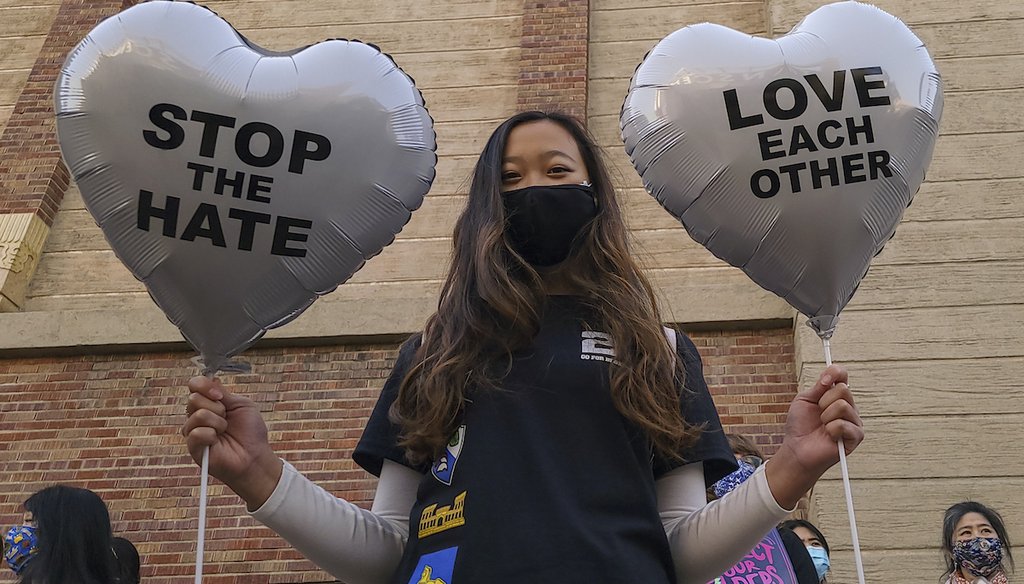Stand up for the facts!
Our only agenda is to publish the truth so you can be an informed participant in democracy.
We need your help.
I would like to contribute

Chinese-Japanese American student Kara Chu, 18, holds a pair of heart balloons for a rally to raise awareness of anti-Asian violence outside the Japanese American National Museum in Little Tokyo in Los Angeles Saturday, March 13, 2021. (AP)
If Your Time is short
-
The Center for the Study of Hate and Extremism found that anti-Asian American hate crimes reported to police rose 149% between 2019 and 2020.
-
Stop AAPI Hate received reports of nearly 3,800 hateful incidents during the first year of the pandemic. Those racist incidents are not just limited to crimes.
-
Experts say that hate crimes are underreported for a variety of reasons.
As pandemic shutdowns and fear flooded the United States last spring, it brought with it a wave of hate crimes and incidents targeting Asian Americans.
Some were prosecuted as hate crimes, such as a woman in the Bronx who was hit on the head with an umbrella as her assailants used anti-Asian comments. Other incidents may not have resulted in official charges, such as the hurling of racist slurs.
Researchers say they have seen a trend of increasing hate crimes and hateful incidents targeting Asian Americans during the pandemic, documented by community members and journalists over the past year. A mass shooting at Atlanta-area spas on March 16 resulted in eight deaths, the majority of the victims Asian American women. The AP reported that South Korea’s Foreign Ministry said that four of the victims who died were women of Korean descent.
Law enforcement has not yet concluded if the gunman, Robert Aaron Long, will be charged with a hate crime, although legal experts have said that’s possible. Long, a 21-year-old white man, faces eight counts of murder.
Following the Georgia attacks, many politicians and journalists cited two key organizations that had compiled data documenting either hate crimes reported to police or a more broad category of hateful incidents.
The Center for the Study of Hate and Extremism at California State University released findings in early March that showed hate crimes against Asian Americans spiked 149% between 2019 and 2020, even though hate crimes overall declined.
A separate group, Stop AAPI Hate, catalogued nearly 3,800 hateful incidents — which is not limited to crimes — during the first year of the pandemic. (AAPI stands for Asian American and Pacific Islander.) Most of those hateful incidents targeted women.
These numbers are the best available data as of now to show the trend of an increase in anti-Asian hate during the pandemic. But even these numbers are likely a small fraction of actual incidents, including crimes.
"There are barriers to reporting," said Jeannine Bell, an Indiana University law professor and expert on hate crimes. "Individual victims have to feel as if they are comfortable enough to report, and most likely they don’t."
Center for the Study of Hate and Extremism data on hate crimes
The Center for the Study of Hate and Extremism is a longtime respected source of expertise on hate crimes. Researchers used public records from local and state police agencies to gather hate crime reports in 2019 and compare them with 2020.
They focused on anti-Asian hate crimes reported to police in 16 of the largest U.S. cities.
The center found anti‐Asian hate crimes rose from 49 crimes in 2019 to 122 in 2020, an increase of 149%. Researchers faulted negative stereotyping of Asians during the early rise of COVID-19 cases last spring for the first spike.
The spike in hate crimes against Asian Americans was even more glaring because overall hate crimes dropped 7% overall, amid pandemic-driven closures of businesses, schools and public gatherings.
The report doesn’t mention former President Donald Trump. However, it does show that Google searches found spikes for racist terms such as "China virus" and "Kung Flu" spiked throughout 2020. Trump used those terms multiple times that year — including "China virus" as recently as a March 16 interview on Fox News, although there was nothing in his interview to indicate that he knew about the shootings that took place that evening in Georgia.
"Presidential statements have correlated both to increases and decreases in hate crime," said Brian Levin, director of the center which wrote the report. "It is notable that on March 23, (2020), when President Trump refrained from ethnic terms relating to the virus for a day and spoke of tolerance, there were no anti-Asian hate crimes in NYC in what otherwise was a historically bad month for hate crime."
On that day, Trump said that the virus was not the fault of Chinese Americans and tweeted: "It is very important that we totally protect our Asian American community in the United States, and all around the world."
After becoming president in January, Joe Biden signed a memo condemning the "inflammatory and xenophobic rhetoric" against Asian Americans and Pacific Islanders. He called on the attorney general to explore opportunities to combat hate crimes.
The FBI’s hate crime data shows that anti-Asian hate crimes declined in the late 1990s and started to climb in recent years. In 2019, there were 7,314 hate crime incidents overall, according to the FBI, including 158 that were against people of Asian descent. The FBI will release 2020 hate crime figures later this year.
Stop AAPI Hate data
In response to an escalation of bigotry during the pandemic, community groups and the Asian American Studies Department of San Francisco State formed Stop AAPI Hate. The group invites Asian Americans who have experienced hate to report the incidents.
This group logged 3,795 incidents from March 19, 2020, to Feb. 28, 2021. That number represents "only a fraction of the number of hate incidents that actually occur, but it does show how vulnerable Asian Americans are to discrimination, and the types of discrimination they face," the group wrote.
Verbal harassment and shunning — the deliberate avoidance of Asian Americans — made up the two largest proportions of the total incidents reported. Physical assaults comprised 11% of the incidents. Chinese Americans were the largest ethnic group (42.2%) that report experiencing hate.
The report detailed racist insults and accusations of bringing the virus to the United States directed at Asian Americans while they were shopping, using public transportation or online. One parent reported that the owner of a gymnastics business refused to enroll the daughter because of her name.
Stop AAPI Hate focuses on hate incidents more broadly than just crimes in order to analyze widespread manifestations of racism, said Russell Jeung, a leader of Stop AAPI Hate and professor of Asian American studies at San Francisco State University.
"We started tracking for coughing/spitting incidents because we saw such a clear trend in our respondents' reports," Jeung said.
Hate crimes are undercounted
Hate crimes against Asian Americans are "massively underreported," Levin said.
Asian Americans may be reluctant to contact law enforcement for a variety of reasons that can include language or cultural barriers, distrust of police, or fear of repercussions for their immigration status if they aren’t citizens.
It can also be difficult to prove an attacker’s racial bias, said Jeung.
There have been efforts to increase the reporting of hate crimes in recent years. In Georgia, Gov. Brian Kemp signed a law in June that mandated the collection and reporting of hate crimes by law enforcement. The law followed the killing of Ahmaud Arbery, a Black man who was jogging and shot by a former police officer.
The bill removed Georgia from the few states with no hate crime law on the books.
U.S. Rep. Grace Meng, D-N.Y. and Sen. Mazie K. Hirono, D-Hawaii, introduced a bill in March, days before the Georgia shooting, that would designate a Justice Department employee to expedite review of COVID-19 hate crimes.
In the Georgia mass shooting case, the relevance of a hate crime charge wouldn’t change the expected amount of time the gunman will spend in prison. But in general, a hate crime charge serves the important purpose of sending a message to the broader community.
"There is a broader concern about the impact it is having on people who are vulnerable, isolated and traumatized beyond the individual victims," said Steven Freeman, vice president of civil rights at the Anti-Defamation League, an organization that tracks anti-Semitic hate crimes and has called for stronger state laws.
Law enforcement may not charge an incident as a hate crime if there isn’t clearly identifiable evidence that race was the motivation of the attacker. But for the community that feels victimized, the hate crime charge is important.
"It’s an acknowledgement to the community that someone did something because of bias," Bell said.
Our Sources
Center for the Study of Hate and Extremism at California State University, San Bernardino, FACT SHEET: Anti‐Asian Prejudice, March 2021
Washington Post, Asian Americans in Atlanta stunned by shootings as advocates demand action: ‘Everyone has heard enough words,’ March 17, 2021
Press conference with Georgia officials following shooting, March 17, 2021
AP, Georgia's Kemp signs hate crimes law after outcry over death, June 26, 2021
Reuters, Trump: Asian-Americans not responsible for virus, need protection, March 23, 2021
White House, Memorandum Condemning and Combating Racism, Xenophobia, and Intolerance Against Asian Americans and Pacific Islanders in the United States, Jan. 26, 2021
Sen. Mazie K. Hirono press release, Hirono and Meng Introduce Bill to Address Surge of Anti-Asian Hate Crimes During Coronavirus Pandemic, March 11, 2021
Rep. Ted Lieu, Press release, July 2020
Atlanta Journal-Constitution, Charges for accused mass shooter could include hate crimes, experts say, March 17, 2021
Stop AAPI Hate, National report, March 19, 2020-Feb. 28, 2021
Atlanta Police Department, Press releases, March 17, 2021
NBC, Woman needed stitches after anti-Asian hate crime attack on city bus, NYPD says, April 5, 2021
New York Times, The Slur I Never Expected to Hear in 2020, April 12, 2021
AP, EXPLAINER: Why Georgia attack spurs fears in Asian Americans, March 19, 2021
U.S. Rep. Jamaal Bowman, Tweet, March 17, 2021
U.S. Rep. Cori Bush, Tweet, March 17, 2021
FBI, hate crime statistics, 2019
Phoenix council woman elect Yassamin Ansari, Tweet, March 17, 2021
White House, Memo, Jan. 26, 2021
Forbes, Trump Once Again Calls Covid-19 Coronavirus The ‘Kung Flu,’ June 24, 2020
Trump twitter archive, Search for "China virus," 2020-2021
CQ Transcription, Interview with former President Donald Trump on Fox News, March 16, 2021
Snopes, Did Trump Refer to ‘China Virus’ on Fox the Night Asian Women Were Killed in Atlanta? March 17, 2021
PolitiFact, Explaining the numbers behind the rise in reported hate crimes, April 3, 2019
PolitiFact, Did counties hosting a Trump rally in 2016 see a 226% spike in hate crimes? Aug. 12, 2019
PolitiFact, South Carolina, Georgia, 3 other states don't have hate crimes laws, July 1, 2015
Telephone interview, Brian Levin, director of the Center for the Study of Hate & Extremism and professor of criminal justice California State University, San Bernardino, March 17, 2021
Email interview, Russell Jeung, a leader of Stop AAPI Hate and professor of Asian American studies at San Francisco State University, March 17, 2021
Email interview, Ayal Feinberg, assistant professor of political science at Texas A&M University, March 17, 2021
Email interview, Chata Spikes, Atlanta police spokesperson, March 17, 2021
Telephone interview, Steven Freeman, Vice President of Civil Rights and Director of Legal Affairs at the ADL, March 18, 2021
Telephone interview, Jeannine Bell, Indiana University Maurer School of Law — Bloomington law professor, March 18, 2021












































